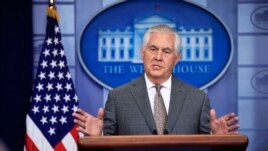21 November, 2017
The United States has again listed North Korea as a state supporter of terrorism.
The move permits new sanctions to pressure North Korea to end its banned nuclear and long-distance missile activities.
The U.S. decision was welcomed by South Korea and Japan. In Tokyo, Prime Minister Shinzo Abe told reporters Japan supports the step as a way to increase pressure on North Korea.
South Korea's foreign ministry said it sees the decision "as part of the international community's joint efforts to take North Korea to the path of denuclearization."
China reacted carefully to the decision. Foreign Ministry spokesman Lu Kang called the current situation "highly sensitive." He said it would be "helpful to bring all parties back to the negotiation table, instead of doing the opposite."
The U.S. move returned North Korea to a State Department list of state sponsors of terrorism. The only other countries on the list are Iran, Syria and Sudan.
North Korea was first placed on the list in 1988 after agents of the government destroyed a South Korean passenger airplane, killing 115 people. The U.S. removed North Korea from the list in 2008 when the country met international requirements for limiting its nuclear program.
President Donald Trump spoke about the decision Monday. He said the terror declaration "should have happened years ago." Trump also called the North Korean government "a murderous regime."
A State Department official told VOA the U.S. had determined that North Korea had "repeatedly provided support for acts of international terrorism," including assassinations on foreign soil.
Placing North Korea on the list is part of a campaign by the Trump administration to pressure North Korea to give up its nuclear weapons program. That campaign already includes a series of United Nations Security Council sanctions meant to punish North Korea for its nuclear and missile tests.
North Korea has said it will never end its nuclear weapons program, which it considers necessary for its defense against a possible U.S. attack.
Trump said the new measures announced "will be the highest level of sanctions" put in place so far against North Korea.
Secretary of State Rex Tillerson told reporters the sanctions already in place are having an effect. He said there is evidence that the restrictions have led to fuel shortages and less income for North Korea.

Secretary of State Rex Tillerson speaks about North Korea during the daily press briefing in the Brady Press Briefing Room at the White House, in Washington, Monday, Nov. 20, 2017. (AP Photo/Manuel Balce Ceneta)
Tillerson urged China to take more steps to cut fuel supplies to the North. About 90 percent of North Korea's trade is with China. But China has resisted major economic measures that could cause North Korea to collapse.
Tillerson said he still hopes for a peaceful solution. With the new sanctions in place, he warned North Korean leader Kim Jong Un, "This is only going to get worse until you're ready to come and talk.''
I'm Bryan Lynn.
Bryan Lynn wrote this story for VOA Learning English, based on reports from VOA News, the Associated Press, Reuters and Agence France-Presse. Mario Ritter was the editor.
We want to hear from you. Write to us in the Comments section, and visit 51VOA.COM.
_____________________________________________________________
Words in This Story
sanction – n. measures taken by countries to force other nations to obey international law, usually by limiting trade or finance
sensitive – adj. easily upset by things people say or do
regime – n. form of government
determined – adj. wanting to do something very much without letting anything stop it
assassination – n. the killing of someone, usually for political reasons